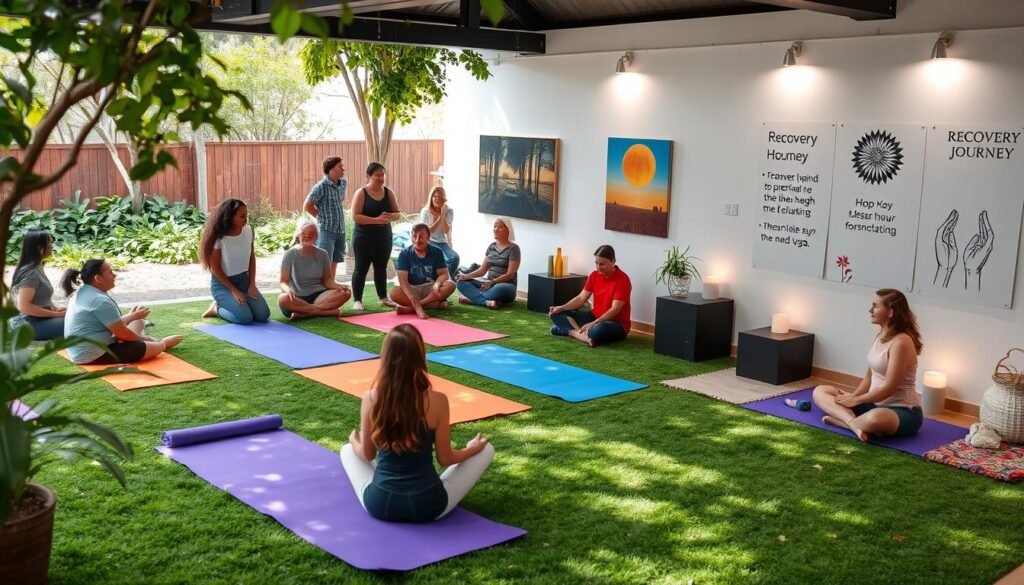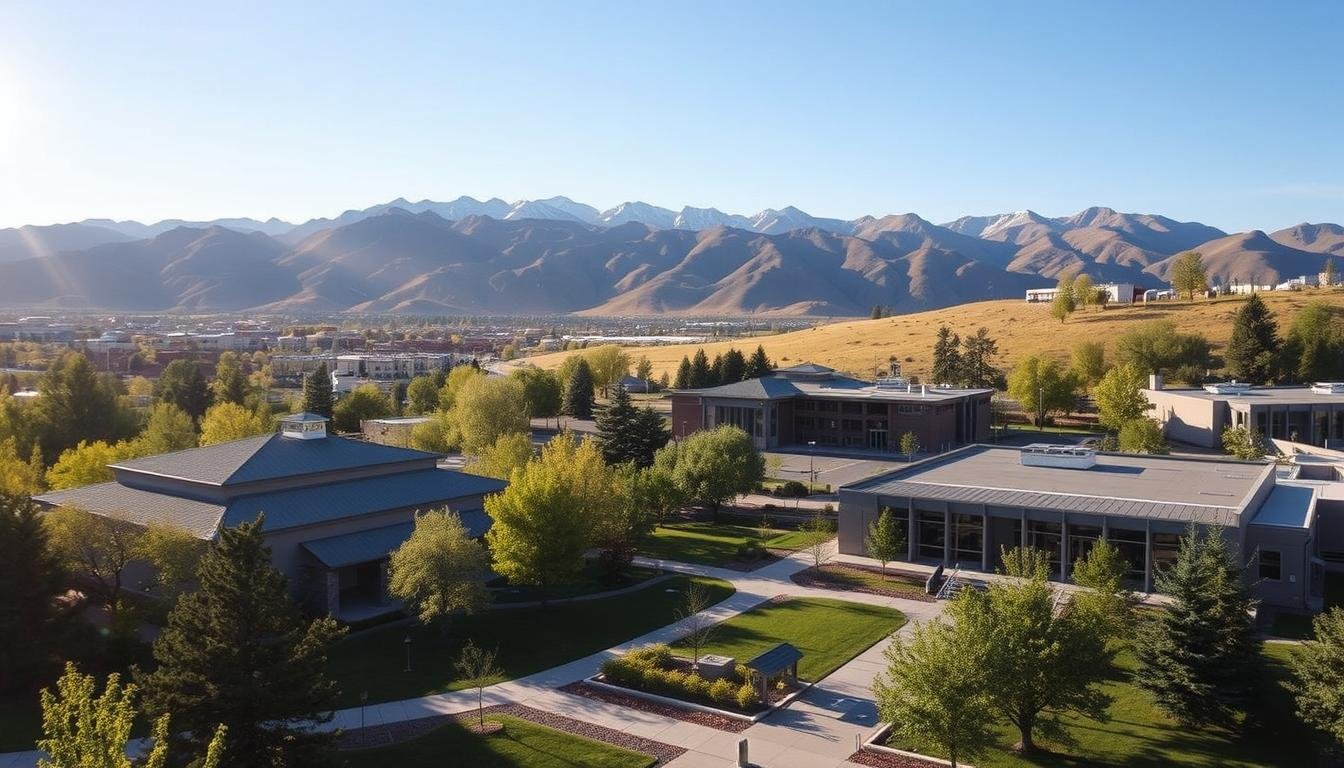Are you ready to break free from addiction and take back your life? Denver’s rehab programs offer hope for those struggling. They provide a path to recovery that can change lives.
Substance Use Disorder (SUD) impacts many in Denver and beyond. Picking the right rehab is key to healing. Denver’s facilities offer detox, residential care, and outpatient services for all levels of addiction.
The Recovery Village Palmer Lake is known for its evidence-based treatments. They use Cognitive Behavioral Therapy (CBT) and Dialectical Behavior Therapy (DBT). These methods, led by skilled professionals, are key to recovery. Mountain Springs Recovery offers a peaceful setting with traditional and holistic therapies, plus amenities like a pool and fitness center.
Looking for intensive counseling or a full residential program in Denver? Help is here. Recovery begins with taking that first step – asking for support.
Key Takeaways
- Denver offers diverse rehab options for substance abuse recovery
- Evidence-based therapies are central to effective treatment programs
- Rehabilitation centers provide various levels of care, from detox to outpatient
- Co-occurring disorders are addressed in many Denver treatment facilities
- Serene environments and amenities can support the recovery process
- Professional addiction counseling is a critical part of treatment
Understanding Drug and Alcohol Addiction in Denver
Drug and alcohol addiction is a big problem in Denver, touching many lives. It’s key to spot the signs early and get help from rehab denver facilities. We’ll look at how substance use disorders affect people and the latest stats in Colorado.
Signs and Symptoms of Substance Use Disorder
Spotting addiction early can help a lot. Common signs include:
- Inability to go a day without using
- Experiencing withdrawal symptoms
- Hiding or lying about substance use
- Drinking more than intended
- Failed attempts to cut down
Impact on Individual and Community Health
Substance abuse harms personal health and community well-being. Chronic alcohol abuse can cause liver disease, heart issues, and increase cancer risk. It also strains relationships, impacts job performance, and leads to legal problems. The rise of potent substances like fentanyl has raised overdose risks in Denver.
Current Addiction Statistics in Colorado
Recent data shows the need for strong rehab denver programs:
- Millions of individuals struggle with alcohol addiction
- Women are more likely to experience co-occurring mental health issues
- Untreated addiction results in significant healthcare and productivity costs
Northpoint Denver and Recover Colorado offer tailored drug treatment colorado options. They include detox, counseling, and strategies to prevent relapse. These programs aim to provide complete care, tackling addiction and mental health for lasting recovery.
Types of Addiction Treatment Programs Available
Denver has many addiction treatment options. These include medical detox to luxury rehab centers. There’s something for everyone, no matter the situation.
Medical Detoxification Services
Detox programs help those addicted to alcohol, opiates, or benzodiazepines. They last 3 to 7 days. Medical staff manage withdrawal symptoms safely.
Residential Treatment Options
Residential rehab offers 24/7 support. Patients stay for 28+ days, getting intensive treatment. It’s great for those needing a structured environment.
Outpatient Programs and Services
Outpatient programs are flexible. They let people get help while keeping up with daily life. Intensive Outpatient Programs (IOPs) last 3 to 6 months. They’re good for those transitioning or needing ongoing support.
Luxury Rehabilitation Centers
Luxury rehab centers, like Healing Pines Recovery, offer unique treatments. They have amenities like hiking trails and mini donkeys. This creates a comfortable recovery environment.
After treatment, sober living facilities are helpful. They provide a structured environment for adjusting to life after treatment. Residents can also attend day treatment or IOP sessions.
| Treatment Type | Duration | Best For |
|---|---|---|
| Medical Detox | 3-7 days | Alcohol, opiate, benzodiazepine dependence |
| Residential Rehab | 28+ days | 24/7 support and structured environment |
| Intensive Outpatient | 3-6 months | Structured support without 24/7 care |
| Outpatient Treatment | Varies | Maintaining daily obligations |
| Sober Living | Varies | Transition after formal treatment |
Getting help in Denver is the first step to recovery. Whether it’s outpatient programs or residential treatment, the right support is key to sobriety.
drug-addiction-help/drug-addiction-hotline-residential-drug-treatment-denver
Denver has many resources for fighting drug addiction. Red Rock Recovery Center is a top choice with its accredited programs. They teach community building and life skills for staying sober.
Need help fast? Call the drug addiction hotline at 888.315.3998. Talk to caring experts who can help find treatment options. This hotline is a lifeline for those in Denver, CO.
Residential drug treatment is key for many. These programs offer constant care and support. In Denver, you can find luxury or more affordable options, meeting different needs.
“Recovery is a journey, not a destination. Every step counts.”
Treatment methods vary, including:
- Medical detoxification
- Inpatient programs
- Partial Hospitalization Programs (PHP)
- Intensive Outpatient Programs (IOP)
- Structured living recovery residences
These programs include family therapy, group sessions, and one-on-one counseling. Many centers also help with mental health issues, knowing they’re linked to addiction.
| Service | Description |
|---|---|
| Drug Addiction Hotline | 24/7 support and guidance |
| Residential Treatment | Full-time care and structured environment |
| Outpatient Programs | Flexible treatment while maintaining daily life |
Remember, asking for help is brave. Denver’s treatment options offer hope and healing for those fighting addiction.
Leading Denver Rehabilitation Centers
Denver has many top rehabilitation centers for those fighting drug addiction. These places offer full care and support for those struggling with substance use disorders.
The Recovery Village Palmer Lake
The Recovery Village Palmer Lake is near the Rockies. It offers drug treatment in Denver, CO, in a peaceful setting. They provide everything from detox to aftercare, making sure each patient gets a treatment plan that fits them.
Mountain Springs Recovery
Mountain Springs Recovery is a top choice for rehab in Denver. It’s in a beautiful mountain area with a pool and fitness center. They mix medical treatment with holistic therapies to tackle addiction’s physical and mental sides.
The Raleigh House
The Raleigh House combines traditional and new therapies in their programs. They use equine and art therapy, among others. This variety helps clients find the best way to recover.
Red Rock Recovery Center
Red Rock Recovery Center focuses on caring, evidence-based treatment. They build a community and teach life skills to help clients stay sober. Each client gets a care plan and lots of aftercare support.
| Center | Unique Feature | Treatment Approach |
|---|---|---|
| The Recovery Village Palmer Lake | Serene Rocky Mountain setting | Evidence-based, full spectrum care |
| Mountain Springs Recovery | Pool and fitness center | Medical and holistic therapies |
| The Raleigh House | Equine and art therapy | Diverse treatment options |
| Red Rock Recovery Center | Strong community focus | Life skills development, aftercare support |
These leading centers accept many insurance plans and offer different levels of care. They help with detox and aftercare, supporting recovery from substance use disorders.
Treatment Approaches and Therapies
Denver rehab centers use many evidence-based treatments for substance use disorders. They mix different therapies to give full care to those looking to recover.
Cognitive Behavioral Therapy (CBT) is key in treating addiction. It helps people change bad thought patterns and behaviors linked to substance use. Dialectical Behavior Therapy (DBT) adds to CBT, teaching skills for managing emotions and stress.
Many centers include 12-step meetings in their programs. These group sessions offer support from peers and a clear path to recovery. They focus a lot on preventing relapse, teaching ways to stay sober over time.
Holistic therapies add to the traditional methods. They might include art therapy, meditation, and yoga. These activities help improve overall well-being and reduce stress.
| Therapy Type | Focus Area | Benefits |
|---|---|---|
| CBT | Thought patterns | Behavior change |
| DBT | Emotional regulation | Stress management |
| 12-Step Meetings | Peer support | Structured recovery |
| Holistic Therapies | Overall well-being | Stress reduction |
Addiction counseling is at the heart of these programs. One-on-one sessions let therapists focus on each person’s needs and create personalized plans. Family therapy is also important, helping to mend relationships and build a support network for recovery.
Dual Diagnosis and Mental Health Support
Recovering from substance abuse often means dealing with mental health issues too. Many people with addiction also have mental health problems. This makes it key to treat both together for a real recovery.
Common Co-occurring Disorders
Dual diagnosis is common in addiction cases. The most common mental health issues that go along with addiction are:
- Anxiety Disorders
- Post-Traumatic Stress Disorder (PTSD)
- Attention-Deficit/Hyperactivity Disorder (ADHD)
- Borderline Personality Disorder (BPD)
- Eating Disorders

Integrated Treatment Approaches
Denver rehab centers offer full care for dual diagnosis. They mix substance abuse treatment with mental health care. This way, they treat the whole person, not just one part.
Intervention services start with checking for other mental health issues. They use tests and the DSM for accurate diagnoses.
Therapeutic Interventions
There are many ways to treat effectively:
- Cognitive Behavioral Therapy (CBT)
- Dialectical Behavioral Therapy (DBT)
- Motivational Interviewing
- Contingency Management
These therapies help people change their thinking, learn to cope, and avoid going back to addiction. Family support is also very important. Many programs include family therapy sessions.
Treatment options vary based on what each person needs. It can range from outpatient programs to more intense residential care. Sometimes, medication is used along with therapy for the best results.
Insurance Coverage and Payment Options
Looking for drug treatment in Colorado or Denver can seem scary, mainly because of the cost. But, many places offer different ways to pay, making treatment more reachable.
Accepted Insurance Providers
Most rehab centers in Denver take big insurance plans. United Healthcare is one of them, covering detox, therapy, and aftercare. They offer both inpatient and outpatient care, with each policy having its own details.
Financial Assistance Programs
If you don’t have insurance, many places offer help. They might have sliding scale fees or grants for treatment. Some even partner with local non-profits to help those in need.
Payment Plans and Options
Rehab centers usually have flexible payment plans. You might pay in monthly installments or get financing. Some even accept credit cards or personal loans. It’s important to talk about these options with the center you choose.
| Payment Option | Availability | Benefit |
|---|---|---|
| Insurance | Widely accepted | Reduces out-of-pocket costs |
| Financial Aid | Limited availability | Makes treatment accessible for low-income individuals |
| Payment Plans | Common | Spreads cost over time |
Remember, investing in rehab in Denver is investing in your future. Don’t let money worries stop you from getting the help you need. There are many ways to make treatment affordable and within reach.
Aftercare and Recovery Support Services
Aftercare and recovery support services are key to keeping sobriety long-term. They help those who’ve finished primary treatment adjust to daily life. They also keep them focused on their recovery journey.
Sober living facilities offer a supportive place to practice new skills. They help build a strong recovery foundation. These places provide structure, accountability, and a community feeling, all vital for staying sober.

12-step meetings are a big part of aftercare. They offer ongoing support and a chance to share experiences. Going to these meetings regularly can lower relapse risk and help feel part of the recovery community.
Relapse prevention education is also key. It teaches how to spot triggers, manage cravings, and handle risky situations. Learning healthy ways to cope helps keep sobriety strong when faced with challenges.
| Aftercare Service | Percentage of Clients Benefiting |
|---|---|
| Sober Living Facilities | 78% |
| 12-Step Meetings | 85% |
| Relapse Prevention Education | 92% |
| Ongoing Therapy | 89% |
Many rehab centers in Denver have detailed aftercare programs. These include outpatient services, alumni groups, and family support. They understand recovery is a journey. They offer the tools needed to stay sober and live a fulfilling life in recovery.
Conclusion
Denver is dedicated to helping people with substance use disorders. It offers many treatment options. Places like ARTS and Mile High Recovery Center provide support.
These centers use proven therapies like CBT, DBT, and EMDR. They tailor these treatments to fit each person’s needs.
The city focuses on treating alcohol, heroin, and amphetamine addiction. With over 700,000 people in Denver and nearly 3 million in the metro area, there’s a big need for help. Luckily, many places offer residential treatment that lasts from 30 to 90 days.
The Colorado Substance Abuse Hotline is available 24/7. It offers free and confidential help. Remember, recovery is a journey. Denver’s centers are ready to help you every step of the way.
If you or someone you know needs help, don’t wait. Reach out and get help in Denver today.
